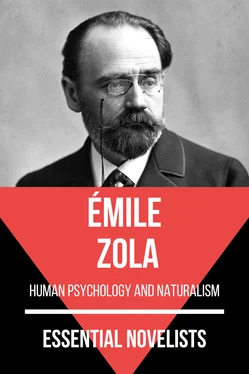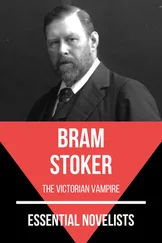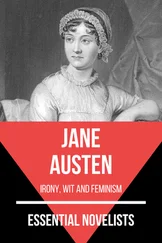"No, not Maigrat's; mother won't let me."
"Why? is there any need to say where one goes? He has the best ribbons in Montsou."
When Maigrat saw lanky Chaval and Catherine coming to his shop like two lovers who are buying their engagement gifts, he became very red, and exhibited his pieces of blue ribbon with the rage of a man who is being made fun of. Then, when he had served the young people, he planted himself at the door to watch them disappear in the twilight; and when his wife came to ask him a question in a timid voice, he fell on her, abusing her, and exclaiming that he would make them repent some day, the filthy creatures, who had no gratitude, when they ought all to be on the ground licking his feet.
Lanky Chaval accompanied Catherine along the road. He walked beside her, swinging his arms; only he pushed her by the hip, conducting her without seeming to do so. She suddenly perceived that he had made her leave the pavement and that they were taking the narrow Réquillart road. But she had no time to be angry; his arm was already round her waist, and he was dazing her with a constant caress of words. How stupid she was to be afraid! Did he want to hurt such a little darling, who was as soft as silk, so tender that he could have devoured her? And he breathed behind her ear, in her neck, so that a shudder passed over the skin of her whole body. She felt stifled, and had nothing to reply. It was true that he seemed to love her. On Saturday evenings, after having blown out the candle, she had asked herself what would happen if he were to take her in this way; then, on going to sleep, she had dreamed that she would no longer refuse, quite overcome by pleasure. Why, then, at the same idea to-day did she feel repugnance and something like regret? While he was tickling her neck with his moustache so softly that she closed her eyes, the shadow of another man, of the lad she had seen that morning, passed over the darkness of her closed eyelids.
Catherine suddenly looked around her. Chaval had conducted her into the ruins of Réquillart and she recoiled, shuddering, from the darkness of the fallen shed.
"Oh! no! oh, no!" she murmured, "please let me go!" The fear of the male had taken hold of her, that fear which stiffens the muscles in an impulse of defence, even when girls are willing, and feel the conquering approach of man. Her virginity which had nothing to learn took fright as at a threatening blow, a wound of which she feared the unknown pain.
"No, no! I don't want to! I tell you that I am too young. It's true! Another time, when I am quite grown up."
He growled in a low voice:
"Stupid! There's nothing to fear. What does that matter?"
But without speaking more he had seized her firmly and pushed her beneath the shed. And she fell on her back on the old ropes; she ceased to protest, yielding to the male before her time, with that hereditary submission which from childhood had thrown down in the open air all the girls of her race. Her frightened stammering grew faint, and only the ardent breath of the man was heard.
Étienne, however, had listened without moving. Another who was taking the leap! And now that he had seen the comedy he got up, overcome by uneasiness, by a kind of jealous excitement in which there was a touch of anger. He no longer restrained himself; he stepped over the beams, for those two were too much occupied now to be disturbed. He was surprised, therefore, when he had gone a hundred paces along the path, to find that they were already standing up, and that they appeared, like himself, to be returning to the settlement. The man again had his arm round the girl's waist, and was squeezing her, with an air of gratitude, still speaking in her neck; and it was she who seemed in a hurry, anxious to return quickly, and annoyed at the delay.
Then Étienne was tormented by the desire to see their faces. It was foolish, and he hastened his steps, so as not to yield to it; but his feet slackened of their own accord, and at the first lamppost he concealed himself in the shade. He was petrified by horror when he recognized Catherine and lanky Chaval. He hesitated at first: was it indeed she, that young girl in the coarse blue dress, with that bonnet? Was that the urchin whom he had seen in breeches, with her head in the canvas cap? That was why she could pass so near him without his recognizing her. But he no longer doubted; he had seen her eyes again, with their greenish limpidity of spring water, so clear and so deep. What a wench! And he experienced a furious desire to avenge himself on her with contempt, without any motive. Besides, he did not like her as a girl: she was frightful.
Catherine and Chaval had passed him slowly. They did not know that they were watched. He held her to kiss her behind the ear, and she began to slacken her steps beneath his caresses, which made her laugh. Left behind, Étienne was obliged to follow them, irritated because they barred the road and because in spite of himself he had to witness these things which exasperated him. It was true, then, what she had sworn to him in the morning: she was not any one's mistress; and he, who had not believed her, who had deprived himself of her in order not to act like the other! and who had let her be taken beneath his nose, pushing his stupidity so far as to be dirtily amused at seeing them! It made him mad! he clenched his hands, he could have devoured that man in one of those impulses to kill in which he saw everything red.
The walk lasted for half an hour. When Chaval and Catherine approached the Voreux they slackened their pace still more; they stopped twice beside the canal, three times along the pit-bank, very cheerful now and occupied with little tender games. Étienne was obliged to stop also when they stopped, for fear of being perceived. He endeavoured to feel nothing but a brutal regret: that would teach him to treat girls with consideration through being well brought up! Then, after passing the Voreux, and at last free to go and dine at Rasseneur's, he continued to follow them, accompanying them to the settlement, where he remained standing in the shade for a quarter of an hour, waiting until Chaval left Catherine to enter her home. And when he was quite sure that they were no longer together, he set off walking afresh, going very far along the Marchiennes road, stamping, and thinking of nothing, too stifled and too sad to shut himself up in a room.
It was not until an hour later, towards nine o'clock, that Étienne again passed the settlement, saying to himself that he must eat and sleep, if he was to be up again at four o'clock in the morning. The village was already asleep, and looked quite black in the night. Not a gleam shone from the closed shutters, the house fronts slept, with the heavy sleep of snoring barracks. Only a cat escaped through the empty gardens. It was the end of the day, the collapse of workers falling from the table to the bed, overcome with weariness and food.
At Rasseneur's, in the lighted room, an engine-man and two day-workers were drinking. But before going in Étienne stopped to throw one last glance into the darkness. He saw again the same black immensity as in the morning when he had arrived in the wind. Before him the Voreux was crouching, with its air of an evil beast, its dimness pricked with a few lantern lights. The three braziers of the bank were burning in the air, like bloody moons, now and then showing the vast silhouettes of Father Bonnemort and his yellow horse. And beyond, in the flat plain, shade had submerged everything, Montsou, Marchiennes, the forest of Vandame, the immense sea of beetroot and of wheat, in which there only shone, like distant lighthouses, the blue fires of the blast furnaces, and the red fires of the coke ovens. Gradually the night came on, the rain was now falling slowly, continuously, burying this void in its monotonous streaming. Only one voice was still heard, the thick, slow respiration of the pumping engine, breathing both by day and by night.
Читать дальше












